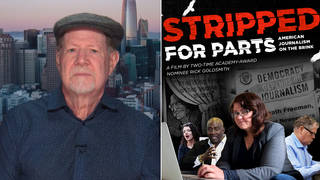
Guests
- Srividhya Swaminathanchair of the English Department at Long Island University Brooklyn. She is one of 400 faculty union members locked out of the campus.
- Kiyonda Hesteran LIU social work graduate student who is president of the campus group Activists for Social Justice and joined hundreds of students in walking out of classes on Monday.
This was supposed to be the second week of classes at Long Island University’s campus in Brooklyn, but the administration barred all 400 members of the faculty union from its Brooklyn campus after their contract expired on August 31. The new proposed contract would slash pay for adjunct professors and also pay faculty lower salaries compared to those earned by colleagues at a satellite campus. As part of the lockout, LIU cut off professors’ email accounts and health insurance, and told them they would be replaced. LIU President Kimberly Cline has assured students the lockout would not affect the beginning of the school year. But since the semester began, classes have been taught by replacement teachers, and many are assigned to teach subjects for which they have no experience. We speak with locked-out professor Srividhya Swaminathan, chair of the English Department at Long Island University Brooklyn. We are also joined by Kiyonda Hester, an LIU social work graduate student who is president of the campus group Activists for Social Justice and joined hundreds of students in walking out of classes on Monday.
Transcript
AMY GOODMAN: We begin today here in New York, where what may be the first time in U.S. history a university has locked out professors from campus after their contract expired. This was supposed to be the second week of classes at Long Island University’s campus in Brooklyn, but last week the administration barred all 400 members of the faculty union from its Brooklyn campus after their contract expired on August 31st. The new proposed contract would slash pay for adjunct professors and also pay faculty lower salaries compared to those earned by colleagues at a satellite campus. As part of the lockout, LIU cut off professors’ email accounts and health insurance, and told them they would be replaced.
In a letter before the start of classes, LIU President Kimberly Cline assured students the lockout would have no effect on the beginning of the school year. But since the semester started last week, classes have been taught by replacement teachers. Many are scheduled to teach subjects for which they have no experience. In what the school later called an error, the university’s chief operating officer, formerly a professor of political science, was slated to teach yoga. The dean of students for the College of Liberal Arts and Sciences, a botanist by training, was tapped to teach ballet.
Well, on Monday, students staged a walkout from their classes in support of their locked-out professors. Democracy Now! was there.
PROTESTERS: They say lockout! We say walkout! They say lockout! We say walkout!
DEVON WILKS: My name is Devon Wilks. I’m one of the students that put together this protest. Right now, we’re really rallying for our campus president to get our professors back into the office right now. We want our professors to teach. It’s almost been a week since our professors have been locked out, and we’re really upset about that, because we pay almost $40,000 for tuition, and it is unacceptable that our professors are not able to get into the classroom and teach the students.
PROTESTERS: They say lockout! We say walkout! They say lockout! We say walkout!
SRIVIDHYA SWAMINATHAN: My name is Srividhya Swaminathan. I’m the chair of the English Department at LIU Brooklyn. Right now what you’re seeing is a gathering of sympathetic faculty. We are here to support our students as they walk out of class. They are not being supplied with qualified replacement professors, as was promised by this administration, which is a testament to the fact that you cannot replace an entire faculty. The real faculty are out here. We are here, we are ready to teach, and we are being prevented from doing so by this lockout.
PROTESTERS: Join us! Join us! Join us! Join us! Join us! Join us!
VIRGINIA RODRIGUEZ: Virginia Rodriguez. So, I was supposed to have a sociology class this morning. Nobody showed up. Every time I go into a class, they greet you for five to 10 minutes, and they leave. I have no syllabus. They posted a fake syllabus on our blackboard system that’s from last summer. So, I mean, this is just really disappointing, because I pay a lot of money to come to this school. I have two children to support. I cannot afford to take off a whole other semester and keep continuing to put my life on hold. It’s unfair. So, hopefully, we get our professors back as soon as possible.
YVAN DELEN: My name’s Yvan Delen. I didn’t have any class today. I basically came in at 9:00 for no reason. I had no teachers. The students were just sitting there, waited about 25 minutes. No one showed up. I just want this to end. I want my education. I want to get what I’m paying for. I just want this to end. You know, I feel bad for the teachers. I feel bad for the students. It’s really like—it’s really inconvenient.
SHAYLA GRIFFIN: Our professors are not there. They have administrative staff that’s trying to teach our school, and it’s just not working out. Everybody’s walking out of class. There’s nobody there. There’s [inaudible]. It’s horrible. And we want our professors back. Get our professors back.
PROTESTER: What do we want?
PROTESTERS: Our professors!
PROTESTER: When do we want them?
PROTESTERS: Now!
PROTESTER: What do we want?
PROTESTERS: Our professors!
PROTESTER: When do we want them?
PROTESTERS: Now!
STUART FISHELSON: My name is Stuart Fishelson. I’m a faculty member, 30 years in the Media Arts Department. And I’m here because this is what corporations are trying to do to education. They’re trying to corporatize and remove the familiar and the important parts of learning.
SEALY GILLES: My name is Sealy Gilles, and I’ve taught in English Department for almost 20 years. I just retired. I’m supposed to be coming back to teach part-time. And it’s breaking my heart, I have to tell you. It’s a wonderful institution. We have spectacular students, as you can see from this. This president has very little in the way of academic background. She sees herself as a corporate turnaround artist. That’s why the board hired her. And she should be, the board should be ashamed of what’s happening here.
PROTESTERS: LIU, shame on you! LIU, shame on you! LIU, shame on you!
CATHY: I’m looking at you, Dr. Cline. I’m looking at you. This should not be happening.
CHARINA NADURA: How do you feel? Why are you walking out?
CATHY: I’m angered right now. I’ve spent over $100,000, moved to California, to study under my professor, for her to lock them out. I’m in my last year. My licensure is on the line.
AMY GOODMAN: Special thanks to Charina Nadura and Andre Lewis for that report. Those are professors and students at Long Island University’s campus in Brooklyn, speaking during a campus walkout on Monday.
LIU’s Chief Operating Officer Gale Haynes told Democracy Now! in statement, quote, “The University will continue to bargain in good faith, with the goal of welcoming its valued faculty back to the classroom upon timely resolution of the contract. During this timeframe, we will remain laser focused on our students beginning the Fall semester with little or no disruption to their academic studies.”
Well, for more, we’re joined by two guests. Vidhya Swaminathan is the chair of the English Department at Long Island University Brooklyn and one of 400 faculty members locked out of the campus. And Kiyonda Hester is a social work graduate student and president of Activists for Social Justice, a student organization at Long Island University.
We welcome you both to Democracy Now! Professor, let’s begin with you. How long have you been chair of the Department of English?
SRIVIDHYA SWAMINATHAN: This would have been my fifth year as chair. I’ve been at LIU for 13 years.
AMY GOODMAN: What happened?
SRIVIDHYA SWAMINATHAN: It’s very difficult to—it’s a very complicated situation, but essentially what happened is, is we have a president who does not value the labor of faculty and believes that we are replaceable, which is an affront in and of itself. August 31st was the—August 31st was the expiration of our contract. The negotiating team was told on that day that if we did not accept the contract, that we would be locked out. Before the membership was even given the opportunity to vote on this contract, we were told by management that we would be locked out of campus. This was clearly a bullying tactic to force a contract down our throats. Now, the management characterized this contract as fair and reasonable. If that’s truly the case, then why didn’t they give us an opportunity to vote on it before they decided to take the very drastic step of locking us out?
AMY GOODMAN: Where—what were the issues that you were concerned about?
SRIVIDHYA SWAMINATHAN: There are two primary issues, one under the umbrella of economics and one under the umbrella of academic freedom. In terms of economics, there is a parity disagreement with the C.W. Post campus, which is the other main campus, that the contract did not address in satisfactory ways.
AMY GOODMAN: The C.W. Post campus is on Long Island.
SRIVIDHYA SWAMINATHAN: Yes, that’s correct. The other issue in terms of economics was the creation of a two-tier system, that would have greatly disadvantaged incoming adjuncts as well as new hires on full-time faculty lines. And there were also severe restrictions put on adjunct earning capacity. So, basically, they wanted to take back adjunct pay in order to address the disparity with full-time pay, which is just absolutely unacceptable.
The other issue was academic freedom. This management has attempted more and more to encroach on curricular issues that really are the purview of the faculty. They are in violation of all our shared governance agreements. And over the summer especially, they took aggressive steps to disenfranchise faculty by preemptively canceling classes, by putting advertisements on Monster.com for replacement faculty. The whole notion that you could replace a faculty by advertising on Monster.com just flies in the face of what academia is actually about.
AMY GOODMAN: Labor historians say they can’t recall an example of a university using a lockout against their faculty members, that’s total lockout.
SRIVIDHYA SWAMINATHAN: That is correct. For all we know, this is the first in U.S. history, which is why this lockout has national implications.
AMY GOODMAN: So, Kiyonda Hester, you’re a student. What happened on the first day of classes last week? What classes did you have?
KIYONDA HESTER: So, for me, I had my core classes, because I’m in my second year of this program.
AMY GOODMAN: Those are the required classes.
KIYONDA HESTER: Yeah, this is the required classes. So I had my social work forensic science class, that ties in criminal justice for the family welfare. And I went into that class, and the administrative person was there, and he explained that he’s not qualified to teach this. He’s been all over, teaching about 15 other classes that day, that he was assigned to.
AMY GOODMAN: Wait. Now, the president says you will have equal education.
KIYONDA HESTER: Mm-hmm.
AMY GOODMAN: What was the role of the teacher in your class? What was the person’s position before? I mean, he was an administrator?
KIYONDA HESTER: He’s an administrator, yeah. He does—to my knowledge, he does our field placements. But he’s not qualified to teach that class, in particular.
AMY GOODMAN: And he told you that.
KIYONDA HESTER: And he stated that. And he also stated that he just hopes that this will end next week, took attendance, tried to give us a little bit of knowledge, and then we went about our way.
AMY GOODMAN: What other cases were you involved with, or your fellow sister students involved with?
KIYONDA HESTER: Well, I have a friend who’s also in the Social Work Department, and she was literally in the class next door. She’s taking the substance abuse part of the Social Work Department. And she was sent an email stating the change, the room change. They go into the classroom, and I actually peaked in. They have a Skype going on with LIU Post students, where the professor was supposed to teach both classes. They never showed up. Even though they sent an email stating for a room change, they just completely never showed up. So, that’s what we’re dealing with.
And right now, for me, personally, I have no qualified professors, actually, to teach me. I am a student who commutes to LIU Brooklyn. And I chose to have a 8:45 class, which is hard, on a Saturday, considering traffic from the trains in New York, and I only chose that class because I knew the professors and the quality of them and how they can teach us. And that’s not what we’re getting at this point.
AMY GOODMAN: So what are your plans? What are the students doing? Talk about the walkout yesterday.
KIYONDA HESTER: So, we’ve actually—we actually started rallying up that Wednesday. Once we assessed the situation, we quickly got together, and we started then. And we’ve been continuing since then. We’ve been trying to. We’ve been sending letters out to Mayor de Blasio. We’ve been trying to get—send letters out to the board of trustees and call them, send letters to Kimberly Cline. And we’ve also been trying to make as much noise as possible, because we’ve been called, by Gale Haynes, the vocal minority. We’ve been looked at as “Well, that’s just, you know, a few of them who are saying anything; that doesn’t represent the 8,000 students that’s basically on campus in Brooklyn.”
AMY GOODMAN: How much is tuition at Long Island University Brooklyn?
KIYONDA HESTER: It ranges from $30,000 to $54,000, depending on if you’re staying on campus.
AMY GOODMAN: For the year.
KIYONDA HESTER: For the year, yeah.
AMY GOODMAN: Professor, what happened when you were locked out? So, you didn’t walk out; you were locked out.
SRIVIDHYA SWAMINATHAN: Absolutely.
AMY GOODMAN: Pay? Healthcare?
SRIVIDHYA SWAMINATHAN: Everything was cut immediately.
AMY GOODMAN: Your health insurance was immediately cut.
SRIVIDHYA SWAMINATHAN: Yes, exactly. Health insurance was cut. Pay was cut. Again, as I said, this was a bullying tactic to force this contract down the faculty’s throat. We did meet on Tuesday, September 6, to ratify the contract. This, by the way, is what we have done every contract ratification, is met the day after Labor Day. And we voted 226 to 10 not to accept this contract, at which time the administration said the lockout would continue. And the lockout does continue.
My two major issues with the statement that has been issued by this administration is that they are bargaining in good faith and that they are laser-focused on the students, neither of which seems to be true. They are not bargaining in good faith. We have—we are the fifth of five unions on campus that have no contract. So, this is a labor issue writ large. This president is incapable of working with labor and sees us all as fungible commodities, which is deeply problematic. If she is in fact invested in the degrees that this university is claiming to grant, how can she then devalue the degrees the faculty have in training people in order to get these degrees? It seems very counterintuitive to me.
AMY GOODMAN: In a statement supporting the LIU union faculty members, American Federation of Teachers President Randi Weingarten wrote, quote, “Long Island University’s hostile action to lock out faculty rather than deal with the fact that it pays its Brooklyn faculty less than their counterparts is a slap in the face to its students and their teachers. The university would rather act like a tough guy and bully its faculty than meet its academic obligation to its students and confront a moral obligation to not pay one set of educators less than another.” Talk about—well, what are the demographics of the students at C.W. Post, Long Island—in Long Island, LIU’s Long Island campus, versus LIU in Brooklyn?
SRIVIDHYA SWAMINATHAN: They are quite different. The demographics at the C.W. Post campus pulls from the demographics of Long Island. It is a suburban campus, so they don’t have the same degree of diversity that we have on the Brooklyn campus. And by diversity, I mean a broad range, not just racial, but also gender diversity, also diversity in age, as well as diversity in immigration status. We have a lot of first-generation college students. We have a lot of children of immigrants, immigrants themselves, coming to the Brooklyn campus. We are the United Nations of college campuses in many ways. And the Post campus does not have the same degree of diversity, which I find very problematic that then a pay disparity exists between the two campuses.
AMY GOODMAN: LIU has a page on its website dedicated to updating information about the lockout. The school addressed the issue of teacher salaries in contract negotiations, writing, quote, “Based on the most recent contract, the Brooklyn faculty and adjuncts are well compensated when compared to peers at other institutions within the tri-state area and nationally. Average salaries for LIUFF faculty at LIU Brooklyn outperformed 80 percent of peer 4-year Master’s colleges and universities across the United States in academic year 2015-2016.”
The school also describes its reason for the lockout, saying, quote, “While the lockout instituted by the University is an isolated incident, five out of the last six contract negotiations have resulted in strike votes by the LIU Brooklyn faculty—including one lasting nearly two months. … A strike situation—which appeared to be inevitable as the faculty authorized and publicized a vote this year in May, before active negotiations were even underway—would clearly compromise our ability to keep tuition affordable … In the interest of providing stability for students, the University was forced to develop a contingency plan—bringing in a qualified and temporary teaching staff to ensure classes could start as scheduled.” Your response to that?
SRIVIDHYA SWAMINATHAN: The entire statement is riddled with falsehoods. Five out of the last six contracts ended in a strike is a falsehood. We did not strike in 2000. We did not strike in 2006. We do have our—we do have a history of striking. If you go to LIUFF.net, which is our union website, you can pull up a history of when and how we have gone on strike. The two-month strike referred to, I believe, took place in 1985. There have been several contracts since then. So, that is falsehood number one.
Second is, don’t look at comparable institutions; look at your own institution. If there’s a pay disparity between two campuses, it’s irrelevant what other institutions are making. Moreover, they are stealing from the adjuncts to pay the full-timers. It’s robbing Peter to pay Paul. That is not a sound strategy. This president touts the fact that she has saved $30 million for the campus in surplus funds—she describes them as surplus funds—and then turns around and says she can’t pay the faculty. I think if you look at also what administration is paid salary-wise, I think that’s also very telling in terms of their supposed impoverishment. The idea of pitting faculty against the students, as though if one gets something, the other doesn’t, is nasty.
AMY GOODMAN: So what are your plans? You don’t have health insurance now?
SRIVIDHYA SWAMINATHAN: No, do not have health insurance. The union has organized information sessions for its membership on COBRA. We were given information about COBRA from the administration. And even on that, we were given false information. The reason for COBRA was stated as the result of reduction of hours because of a LIUFF job action—again, a falsehood. It was their action against us.
We have also filed for unemployment, which is what we are allowed to do in the event of a lockout. I have never filed for unemployment in my life, and it is galling to have to do so. I spent eight years working on a master’s and a Ph.D. I am a tenured professor. I just achieved full professor status. According to the document, it was supposed to start September 1st. I don’t even know the status of that at this point.
AMY GOODMAN: And what are your plans as a student, as we wrap up?
KIYONDA HESTER: At this point, what we’re going to continue to do is continue to stand behind our faculty and continue to rally outside and to demand to end this lockout. And we just ask everybody to support us; all family, friends, parents, everybody, to come out.
AMY GOODMAN: I want to thank you both for joining us. Vidhya Swaminathan is chair of the English Department at LIU Brooklyn, Long Island University Brooklyn, and Kiyonda Hester, graduate student and organizer at LIU Brooklyn.
This is Democracy Now! We’ll be back in a moment with the woman, 15 years ago, who said no to war on the floor of the House. We’ll hear her speech and speak with her, Congressmember Barbara Lee.












Media Options